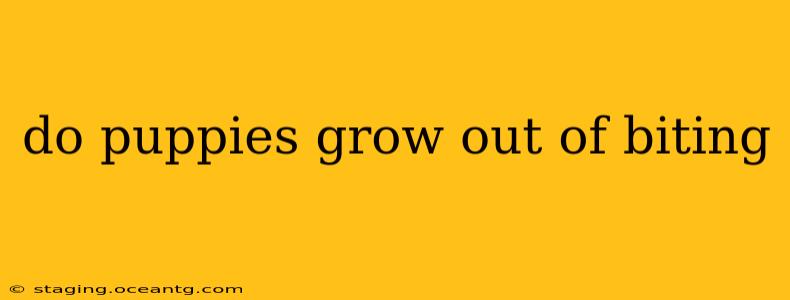Bringing home a new puppy is an exciting time, filled with playful antics and unconditional love. However, the adorable nips and bites that come with puppyhood can quickly become frustrating for new owners. The good news is, yes, puppies do generally grow out of biting, but understanding why they bite and how to manage this behavior is crucial for a happy and harmonious relationship. This comprehensive guide will answer your questions and provide practical strategies to help your puppy learn bite inhibition.
Why Do Puppies Bite?
Puppies bite for several reasons, and understanding these reasons is the first step in curbing the behavior. It's rarely out of aggression; instead, it's often due to:
- Teething: Just like human babies, puppies experience teething pain. Biting helps to relieve this discomfort.
- Exploration: Puppies explore the world through their mouths. Everything is a potential toy to be chewed, tasted, and investigated.
- Play: Biting is a common part of puppy play, especially when interacting with littermates. They learn bite inhibition through play-fighting.
- Excitement/Over-stimulation: An overly excited puppy might nip or bite out of pure enthusiasm.
- Fear/Anxiety: A scared or anxious puppy might bite defensively.
How Long Does Puppy Biting Last?
There's no single answer to how long puppy biting lasts. It depends on several factors, including:
- Breed: Some breeds are naturally more mouthy than others.
- Training: Consistent and positive training significantly impacts bite inhibition development.
- Socialization: Early socialization with other dogs and people helps puppies learn appropriate social behavior.
Generally, most puppies significantly reduce biting by 6 months old. However, some may take longer, and consistent training is key throughout their development.
What Can I Do to Stop My Puppy From Biting?
Managing puppy biting requires patience and consistency. Here are some effective strategies:
- Positive Reinforcement: Reward your puppy for gentle behavior with treats, praise, or toys. This positive reinforcement helps them associate calmness with positive outcomes.
- Bite Inhibition Training: When your puppy bites too hard, immediately stop the play session. Give a firm but gentle "ouch!" and ignore them for a short time. Resume play only when they're calm and behaving appropriately.
- Providing Alternative Chew Toys: Ensure your puppy has plenty of safe and appropriate chew toys to satisfy their chewing needs.
- Managing Excitement: Learn to recognize your puppy's excitement cues and intervene before biting occurs. A calm and quiet environment can help.
- Socialization: Expose your puppy to various people, dogs, and environments in a controlled and positive manner. This helps them learn appropriate social interaction.
- Professional Help: If your puppy's biting is excessive or aggressive, consult a veterinarian or a certified professional dog trainer for guidance.
What if My Puppy Bites Very Hard?
If your puppy's bites are exceptionally hard or aggressive, it's crucial to seek professional help immediately. This could indicate underlying issues, such as fear aggression or inadequate socialization. A veterinarian or certified professional dog trainer can help assess the situation and provide tailored advice and training.
Is it Normal for a Puppy to Bite Its Owner?
While nipping is a normal part of puppy development, hard biting that breaks the skin is not. Consistent training and management are crucial to prevent this behavior from escalating. If your puppy consistently bites hard enough to cause injury, seek professional help.
When Should I Worry About My Puppy's Biting?
You should seek professional help if:
- Your puppy bites hard enough to break the skin.
- The biting is frequent and intense despite training efforts.
- The biting is accompanied by other concerning behaviors, such as growling or snapping.
- Your puppy shows signs of fear aggression when approached.
Conclusion
Puppy biting is a common issue, but with patience, understanding, and consistent training, you can effectively manage this behavior. Remember to be patient and positive, focusing on rewarding good behavior rather than punishing bad behavior. If you are concerned about your puppy's biting, don't hesitate to consult with a veterinarian or certified professional dog trainer. They can provide personalized guidance and support to help you build a strong and loving relationship with your furry companion.
